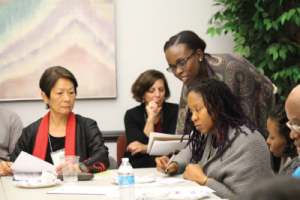“Imagine a world where racial disparities in healthcare could be virtually eliminated. Actually, there is no need to imagine — it has already happened at a health care center in Greensboro, North Carolina, for Black and white patients with breast and lung cancer.”
“Think about that: a critical pathway to closing the racial gap in health outcomes in the United States may already exist. All it took to close the gap and improve treatment completion rates for everyone was the tireless work of the Greensboro Health Disparities Collaborative (GHDC), a group made up of community leaders and advocates, public health researchers and health care professionals. Prior to GHDC’s work, white patients were completing their cancer treatment at a significantly higher rate than Black patients, with a gap of 7 percentage points. To be clear, when it comes to cancer, not completing treatment is fatal. This is the little-known story of how this coalition of volunteers, guided by anti-racist principles, community-driven solutions and authentic partnership — plus an unwavering focus on the structural racism at the root of the inequity — got it done.”
The Greensboro Health Disparities Collaborative (GHDC) is proud to announce the publication of an in-depth case study (PDF), which begins with the words above and tells the story of how and why the GHDC was able to successfully resolve racial disparities in cancer treatment completion.
The Collaborative is a 19-year-old community-academic medical partnership that uses anti-racism, community organizing principles and community-based participatory research to guide successful efforts to implement systemic change. The University of North Carolina at Chapel Hill, Cone Health and the University of Pittsburgh Medical Center have been stalwart partners in conducting rigorous research with the GHDC over the years. The case study is a result of collaboration by The Bridgespan Group, the Groundwater Institute and the Racial Equity Institute.

Collaborative members associated with the Center for Health Promotion and Disease Prevention (HPDP) include Geni Eng, DrPH, professor of health behavior and HPDP research fellow; Alexandra Lightfoot, EdD, associate professor of health behavior, HPDP research fellow, and HPDP community engagement and training core lead; and Samuel Cykert, MD, adjunct professor of health policy and management and HPDP research fellow.
The case study tells the story of the GHDC’s founding and how the group went on to conduct the National Cancer Institute-funded Accountability for Cancer Care through Undoing Racism and Equity (ACCURE) study, which eliminated racial inequities in breast and lung cancer treatment outcomes. Results from the ACCURE study were published in the Journal of the National Medical Association. Further information about the ACCURE interventions are described in a chapter of the book “Racism: Science & Tools for the Public Health Professional” and on the GHDC website.
The voices of several GHDC members, including co-chairs Terence “TC” Muhammad and Kari Thatcher and founding members Eng and Jennifer Schaal, are featured in a teaching case study module called “Seeking Health Equity: Examining Racism as a Social Determinant of Health.”
Adapted from the UNC Gillings School of Global Public Health newsroom. Read the original article.
